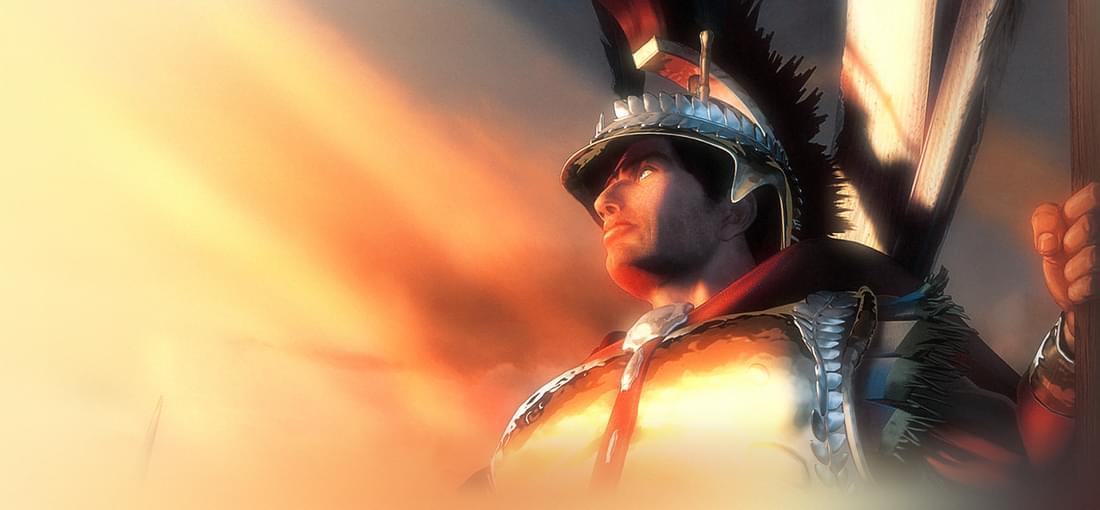


At its core, Empire Earth is an old-school strategy game: you gather resources with your citizens, build buildings, muster an army and try to annihilate the opposing force. It has nothing fancy, like experience-gathering heroes (there are heroes, mind you, but they don't advance levels) or (al)mighty artifacts, only sound strategic gameplay. Yet, it is different from most other base-building RTS games; it neither has a fantasy setting nor is set in some sci-fi world (mostly). It plays out in the various epochs of human history, and on an epic scale, too: the game's timeframe spans from the prehistoric age, when all you can fight with are clubs and stones, to the distant future, complete with mechs and (in the expansion) spaceships. There are 14 epochs in all in the original game, and 15 in the expansion. You may start in any of them, and can set the end to be any of the epochs which come after the starting one (yes, if you're patient /and have a good defense/, you CAN go through all of them in one game ;-)), advancing through them by investing a considerable amount of food, iron and gold in the process. Like in every old-school RTS, the base of your success is a good management of resources. There are 5 of them in the game (food, wood, stone, gold, iron) and you'll need them all in order to succeed: for example, you use wood for most of your buildings, while iron and gold, along with food, go into training various units. One thing to note is that in this game it's virtually impossible to run out of natural resources: every deposit has 300,000 resources in them, which is a HUGE number. Trees, animals and pathces of vegetables are the only exceptions, but there are plenty of trees and you'll want to change from animals and vegetables to farming as soon as possible anyway. Speaking of units, Empire Earth employs a rather solid rock-paper-scissors system, with every type of unit being more vulnerable to something, while having no difficulty in eliminating a certain other target. Unit line-ups are mostly what you may expect from an RTS; there are archers, pikemen, various cavalry, catapults and such in earlier epochs, and riflemen, tanks, airplanes and cannons in later ones. It's not your bog-standard unit composition, though: there are priests and prophets, which give the game a unique flavour, especially the latter. While priests can convert enemy units (and, in later epochs, even buildings!), prophets can call down calamities on unsuspecting foes, such as plague to kill an army in a slow way, or firestorms to wreak havoc among enemy buildings. There are a number of ways to play Empire Earth: if you want to go single-player, you can play one of the campaigns (by the way, they can take an extreme amount of time to finish), play a scenario or go against AI-controlled enemies in a skirmish, either in free for all or teams. And if you'd like to play multiplayer, you can do that too, over a LAN or over the Internet. Finally, the AI of computer-controlled foes deserves a mention; unlike those of many other strategy games, it IS a challenge even for more experienced players. Too bad the same can't be told about the pathfinding AI: for example, units are prone to stumbling over each other in narrower places. Still, it does a relatively good job, and it's not that difficult to get used to its quirks. To speak of the downsides of the game, I think the weakest point of it is the graphics; it's not simply dated, it was ugly even when Empire Earth came out. While it's decent when viewing from a distance, textures (especially those of people) are outright ridiculous when you zoom in on them. So, you'd better watch events from a nice distance, even when not in battle. Also, the (intentionally slow) gameplay may not be that attractive to people used to today's spiced up strategy games. All in all, Empire Earth is a great game in that it delivers what one may expect from it. If you like classic real-time strategies, I advise you to check this one out.

...and Capitalism Plus sure delivers the fun! Also, it's all about money. This game truly showcases the essence of GOG: it is a good (or even great) old game, a real gem from the mid-nineties! I recall playing it for long hours on end, trying to make my company flourish. It was one of my favorite games of the time, and I'm really glad GOG distributes this title now. I hope you'll understand from my review why I'm so enthusiastic about this game. Basically, it's what it seems to be: a business simulation where you start off (depending on settings) either with only an amount of cash or some pre-established firms, and your goal is to make your corporation a flourishing one. You're given everything to do so, and it's up to you how to do this. At first glance, Capitalism Plus may seem quite plain. That's because the graphics are really simplistic; they aren't there for eye candy, only to serve the functionality of the game. All you get is a screen, divided into four smaller ones, of which each has its own function (they show the world map, the area which you have selected, the type of the tile you're on and various info about that tile). That said, it still has some nice touches: every single type of tile, firm and unit has their own picture in the bottom left frame. For example, if you click on a piece of rural area, you see a slope, if you select a supermarket, you get a man putting something in his basket, and so on. Very subtle-yet-good way to liven up the otherwise plain outlook, in my opinion. About the sounds there is even less to say; there are only clicks and some functional sounds, like the sounds of building or demolishing something. (However, the "nice touch" of the graphics is present here as well; for example, most animals have their own sounds.) The original game also had some soundtracks, which the GOG version, due to the lack of the CD-ROM, doesn't; however, you can easily make up for that: fire up any smooth jazz internet-radio and you're all set. (The original soundtrack was a sort of smooth jazz as well, as I recall. Well, mostly.) What Capitalism Plus lacks on the outside, it compensates for tremendously in terms of gameplay. One of the strongest points of the game is the freedom of choice; there are seven types of firms to build and literally hundreds of products to produce and sell. You have so many possibilities to choose from, from farming to retailing, from frozen chicken to high-tech stuff, that you may find it hard to decide what to do first, and how to develop your company. An other strong point, which is a direct consequence of the aforementioned freedom, is the complexity of the game. You can produce or buy basic goods, which can be processed into other goods, which you can then either sell (if they're products for the customers), or, in the case of semi-products, further process into finished goods to sell. For example, you can grow cotton on your farms, which can be made into textiles, which you can't sell to the public, but from which you can make jeans. An other example (for a slightly more complex chain): you get milk from a farm and mine silica from a mine. You then process the silica into glass, and from this glass and the milk you can produce bottled milk. But complexity is present in other areas of the game as well: there are numerous charts that you can read to have a better understanding of how your business is going, from balance sheets to the popularity of your products in each of the cities in the game, and all of these go quite in detail. Like I said earlier, your immediate goal is to make your business empire profitable, but, unless you play an open-ended game, there are some other goals to achieve; these can be having a given net worth, dominating certain areas, having a given annual profit and so on. This also adds to the gameplay value. You can also set the game difficulty manipulating various settings; for example, you can set how aggressive your CPU-controlled competitors should be, how much cash they have, how local traders play and so on. Capitalism Plus also has a terrific replayability value. After you finish the tutorial (which is extremely recommended in a game of this complexity), you have a myriad of scenarios to choose from, from the very basic Entrepreneurial Spirit (which is basically a place to practice the knowledge you gained in the Tutorial, since it is very easy) to the extremely challenging and absolutely non-forgiving Global Domination (in which you have to have dominance of every single market and have 100% ownership of your company, starting off in a very hostile environment, where all your competitors have well-established businesses and superior technology). In between are such interesting ones as the Emerging Dragon (you have to dominate the chemical electronic products market of China while creating at least 10.000 jobs) or Rule Britannia (you have to dominate the mining and manufacturing factors and have an annual operating profit of $500M). And if that's not enough for you, you can create your own game: the program generates a random map for you, which you can then tweak to be to your liking (or you can load one from a file: there is a number of pre-made maps depicting real-world locations), you set the various settings of the game, you set one or more goals (if you wish; otherwise, you can have a "sandbox", endless game) and you're all ready to play your own scenario. Also, there are three game sets to choose from, each with tis own products: Standard game set, Alternative game set and Food and beverages. The first two offer a wide range of products (but, of course, not the same), while the third only focuses on consumable products, and thus shuns mines and logging camps while making farms your single source of basic goods. Of course, the game doesn't only has good points; there are some drawbacks as well. The biggest of these is that the game is intended for only a (thin) layer of gamers, given its complexity and many info sheets. Indeed, if you freak out when you see charts and graphs, this game is clearly not for you, as there are many of them in it. There are also some minor but noticeable nuisances; for example, you have to do an extraordinary amount of clicks and double-clicks during the game (heck, I think there are more clicks done during a game of Capitalism Plus than during a StarCraft match!), which can get tiresome after a while. I know you have to click much in most every strategy game, but I think many of the double-clicks should be replaced by right-clicks; it would be much more convenient. All in all, I find this to be an awesome game, with which one can play for a very, very long time and not get bored. If you have a knack for businesses-themed games, be sure to buy this. You won't be disappointed, and it has a more-than-friendly price now. The only problem that may arise is that you can as well say bye-bye to your real-life activities...